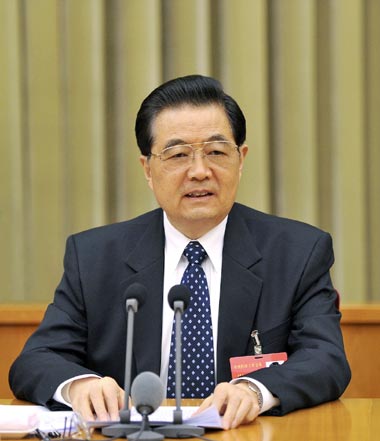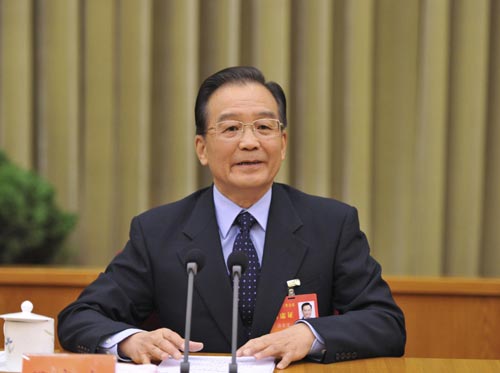More policies to curb inflation
 |
|
Chinese President Hu Jintao speaks at the Central Economic Work Conference which lasts from Dec 10 - 12 in Beijing.[Xinhua] |
China vowed on Sunday to increase efforts to combat inflation while maintaining "stable and relatively fast" economic growth, as consumer inflation hit a 28-month high of 5.1 percent in November.
"The priority is to actively and properly handle the relations between maintaining steady and relatively fast economic growth, economic restructuring and managing inflation expectations," according to a statement released after the high-profile Central Economic Work Conference.
The conference also reaffirmed the recently introduced "prudent" monetary and pro-active fiscal policy for 2011.
But to meet the new monetary policy target, policymakers must strictly implement it, analysts warned.
A surplus of market liquidity is a major contributor to inflation, analysts agreed. New yuan lending - a key indicator of liquidity - already reached the target set for this year in November and is set to exceed it by the end of this month.
The conference made it clear that liquidity will be "well managed" next year and put a priority on "stabilizing overall price levels".
Zhou Wangjun, senior official in charge of price at the National Development and Reform Commission, said on Saturday that China's consumer price index (CPI), a key measure of inflation, could drop to below 5 percent in December.
"Even if that happened, the task would remain daunting for policymakers," said Zhang Xiaojing, senior economist at the Chinese Academy of Social Sciences. "Prices are trending up and a fall in December should not exclude the possibility that they would go up again."
The current liquidity situation is complicated since it is not due to just domestic factors, said Sun Lijian, economist at Fudan University.
 |
|
Chinese Premier Wen Jiabao speaks at the Central Economic Work Conference which lasts from Dec 10 - 12 in Beijing.[Xinhua] |
US Federal Reserve Chairman Ben Bernanke said last week that the Fed could end up increasing its purchase of US government bonds if the economy fails to improve, sparking concern a new round of quantitative easing is in the pipeline.
To control liquidity, policymakers must unswervingly meet the target set by the central government for next year, said Zhang.
Xia Bin, economist at the State Council's Development Research Center and central bank adviser, said earlier that the whole-year target for new yuan loans should be 7.1 trillion yuan ($1.07 trillion). Other economists predicted it could be between 6.5 trillion and 7.4 trillion yuan.
"The target will be meaningless unless we can ensure it will not be crossed," Zhang said, adding that financial institutions have used various methods to avoid regulations to make loans that are not counted in lending statistics.
"The actual amount of such loans could be 2-3 trillion yuan this year, making the real lending figure far higher than the target."
The central bank raised the reserve requirement ratio, or proportion of money commercial banks must keep in reserve, on Friday for the third time in a month, indicating a determination to prevent liquidity driven price rises, analysts said.
Despite the latest move, "interest rate hikes cannot be ruled out", said Zhang. "We have entered an interest rate hike cycle."
"Regulators have yet to show their teeth," said Dong Xian'an, chief economist at Industrial Securities. "The risk of rising inflation in the first half of next year remains."
But measures taken to combat inflation could have unforeseen consequences, an economist warned.
"What has made the government extremely cautious on interest rates are concerns about the risk of overdoing it, which, if coupled with other shocks, could induce a drastic slowdown," said IHS Global Insight economist Xianfang Ren.
The conference said it would make macroeconomic policies next year "cautious and flexible".
Fudan University's Sun said this shows that interest rates are just one weapon. "It means tightening monetary supply would only be one aspect of overall policy," said Sun. "If there was any drastic economic slowdown, the central government would shift to favorable measures to revive the economy."
The annual conference maps out major macroeconomic policies for the following year. This year's meeting also vowed to bridge the income gap, improve people's livelihood and expand opening-up.
 0
0 






